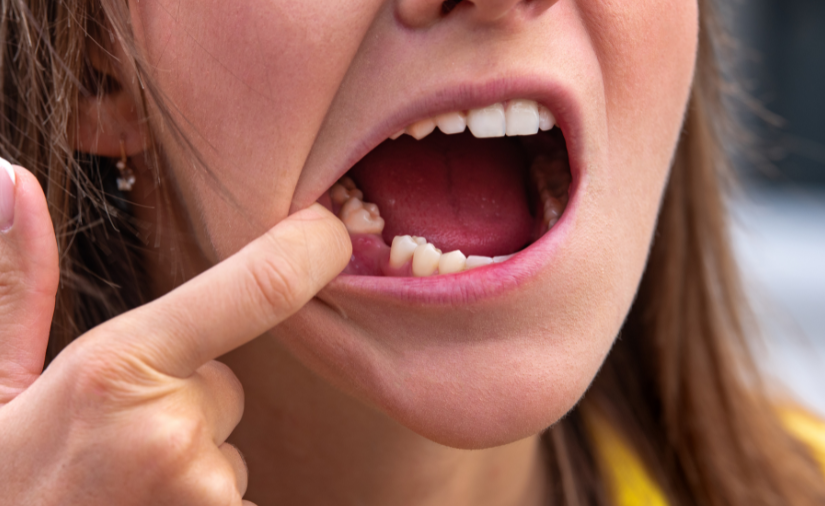By: Dr. Elizabeth Eggert
No one wants to lose their teeth. Unfortunately, many people lose at least one adult tooth in a lifetime for a variety of reasons. But, seeing as it can impact both oral health and quality of life, it is helpful to understand the factors that contribute to tooth loss in order to adopt proactive strategies that help you maintain a healthy smile for years to come.
Let’s explore the common risk factors associated with tooth loss, as well as some practical tips on preventing tooth loss. We’ll also take a look at the various treatment options available at Eggert Family Dentistry to restore and replace missing teeth.
What Is Tooth Loss?
Tooth loss refers to the condition in which a person loses one or more of their natural teeth. Tooth loss can have significant effects on a person’s oral health, as well as their ability to bite, chew, and speak properly. It can also impact one’s self-esteem and overall quality of life. Treating and preventing tooth loss is important not only for maintaining a healthy smile, but also for preserving oral function and overall well-being.
Common Causes and Risk Factors of Tooth Loss
- Gum Disease: Gum disease, also known as periodontal disease, is a common risk factor for tooth loss. When plaque and tartar build up along the gum line, bacteria can infect the gums, leading to inflammation and loss of the supporting bony structures for the teeth, eventually causing tooth loss if left untreated.
- Cavities (Tooth Decay): Untreated tooth decay can result in cavities, which, when left untreated, can progress and reach the inner layers of the tooth. Severe tooth decay can cause tooth infection or abscess, leading to tooth loss.
- Teeth Grinding: The habit of grinding or clenching teeth, known as bruxism, can exert excessive pressure on the teeth, leading to enamel wear, fractures, and tooth loss over time.
- Injury or Trauma: Accidents, sports injuries, or other forms of trauma to the mouth can cause immediate tooth loss, or damage that may eventually lead to tooth loss if not promptly treated.
- Dry Mouth: Saliva plays an important role in neutralizing acids, remineralizing teeth, and washing away bacteria. Not having enough saliva in the mouth increases the risk of tooth decay and gum disease, which can ultimately lead to tooth loss.
- Diabetes: Poor blood sugar caused by uncontrolled diabetes weakens the immune system. A weak immune system will find it harder to fight off infections of the gums, accelerating gum disease and potentially leading to tooth loss.
- Smoking: Tobacco use significantly increases the risk of gum disease by reducing blood flow to the gums, making smokers more susceptible to tooth loss.
How to Prevent Tooth Loss
Hygiene Habits
Make sure you brush and floss and floss your teeth regularly. That means brushing at least twice a day and flossing at least once a day. Additionally, make sure you’re maintaining a regular schedule of dental appointments with Eggert Family Dentistry so Dr. Jeff Eggert and Dr. Elizabeth Eggert can monitor your oral health.
Lifestyle Choices
It should come as no surprise that you need to avoid tobacco consumption in all forms if you want to have a healthy mouth. Other lifestyle changes might include wearing a night guard for bruxism, consuming fewer sugary/acidic foods and drinks, and talking to your medical doctor about treatments for diabetes or high blood pressure to make sure your overall health is being taken care of.
Protective Measures for Sports
If you or a loved one engage in any kind of contact sports, mouth guards are a must. A properly fitted mouthguard can protect your teeth from trauma and prevent tooth loss if an accident happens. Additionally, if your sport allows it, wear a helmet! [DO WE HAVE A PREVIOUS MOUTHGUARD BLOG YOU COULD LINK HERE?]
Treating Tooth Loss
Thanks to modern dentistry, tooth loss doesn’t have to be permanent! At Eggert Family Dentistry, we can recreate the look and feel of your natural teeth using implants or dentures.
Implants are anchored in the bone and they help preserve bone mass in the jaw. Once they are established, you can care for them just as you would your normal teeth, with brushing and flossing. The feel of chewing and speaking will all feel completely familiar. Implants are built to last a lifetime, and they almost always do.
Bridges use the neighboring teeth as anchors to fill in a “tooth” where the natural tooth is missing. Bridges can be a good option if the neighboring teeth also need reconstruction or if the bone isn’t healthy enough for an implant.
Dentures or Partial Dentures are another solution and can be less expensive than implants, however, they may need to be replaced multiple times in a lifetime as the shape of the jaw, mouth and adjacent teeth change over time.
Suffering from Tooth Loss?
If you’re experiencing tooth loss, booking an appointment with Eggert Family Dentistry can be the first step towards restoring your smile. With our compassionate care and expertise, Dr. Jeff Eggert or Dr. Elizabeth Eggert will evaluate your oral health and determine the best treatment options for you. Whether it’s dental implants, bridges, dentures, or other restorative solutions, we can tailor a treatment plan to meet your unique needs. Give us a call today at (651) 482-8412!
